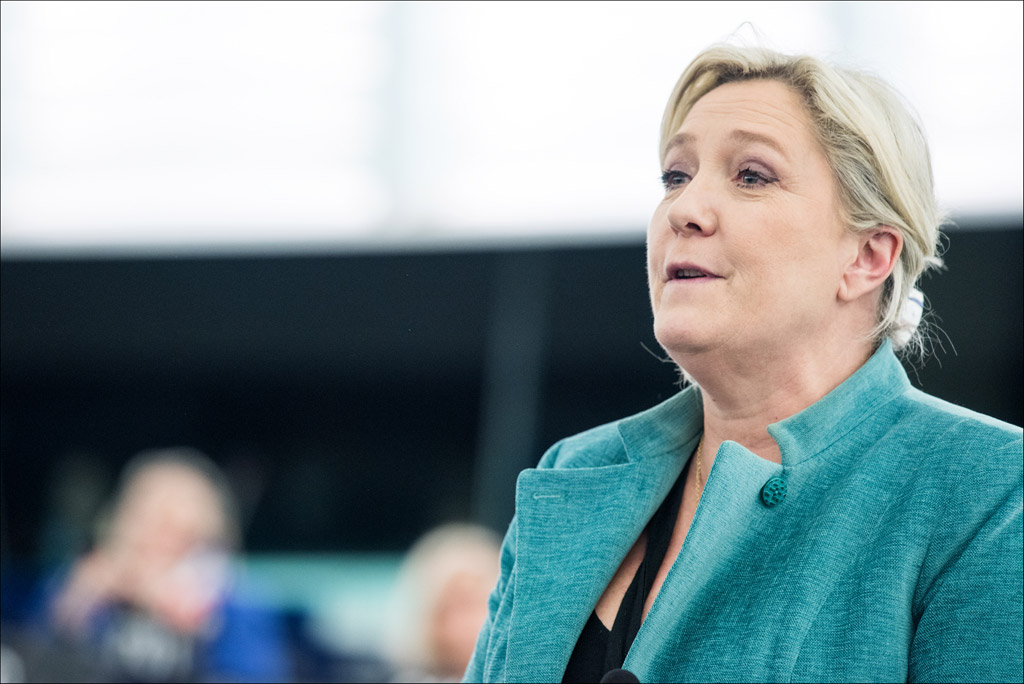
Far from being a fanciful notion, there is a serious possibility that Marine Le Pen could win the presidential election in France in spring 2022. The centre-left Jean Jaurés Foundation, in a report on the subject based on various indicators, deems it ‘not insignificant’. It is an eventuality that must be anticipated because little can be done to prevent it from outside. If it became a reality it could change the debate on European integration, and affect the internal politics of various member states, with serious consequences for the project in general, and for the interests of Spain in particular.
Various opinion polls suggest that the current President, Emmanuel Macron, and the leader of Rassemblement National (formerly Front National) will go through to the second round of the French presidential election, as happened in 2017. Jacques Chirac’s second-round victory in 2002, with 82% of the vote against Jean-Marie Le Pen, Marine’s father (who knocked out the socialist Prime Minister Lionel Jospin in the first round), is now a distant memory. Some polls suggest that Marine Le Pen will lead in the first round and in the second Macron will be re-elected President with 52% of the votes versus 45%, an uncomfortably slim margin of victory for many.
Le Pen, not a new phenomenon but who is now back with renewed vigour, is surfing a new European and US wave: the most marginalised classes voting predominantly for the right. Le Pen has profited from the unease prevailing in France regarding the severity of the lockdowns –which she has lambasted–, the slow rate of vaccination and the trivialisation of terrorism. Illustrative of this are the letters written by a group of former Generals against Islam, immigration (which is not as great as it seems, because much of what is erroneously termed immigration involves second and third generations), the ‘unravelling’ of the country and what they see as the danger of slipping into ‘civil war’, declarations that Le Pen has urged people to support. She maintains that the country has been blindsided by the ‘chaos’ in healthcare, law and order and the economy. Macron himself acknowledges the public’s ‘many fears’, ranging from climate change to insecurity –including what he calls ‘cultural insecurity’– and inequalities, in addition to the pandemic. A poll conducted after the Generals’ letter was released suggested that 58% of French voters supported the officers, and 73% thought that French society was disintegrating.
Macron is becoming increasingly unpopular, due partly to the situation, to his arrogance and to the suspension of reforms caused by the pandemic, with a liberal party, La Republique en Marche, that is not really a party, the right-wing Republicans floundering and in decline, and the left divided, although some on the left argue for a united front to prevent Le Pen progressing to the second round. Le Pen, in the midst of a ‘de-demonisation’ process, uses a rhetoric that continues attracting the working classes –the ‘deplorables’ as Hillary Clinton referred to them, an error Trump was able to exploit and Biden is trying to remedy. She also targets young people, the ones whose life prospects have been most affected by the pandemic. A significant proportion of 18-to-24 year-olds voted for Le Pen in 2017 and are now drifting away from her, but 30% of 25-to-34 year-olds are moving in the opposite direction. Le Pen trumpets a ‘massive programme to help young families’. All this is causing a rightward swing in Macron’s rhetoric.
If she were elected there would remain the question of whether Le Pen would be able to win a sufficient majority in the National Assembly in the immediately succeeding legislative elections, or whether she would have to enter into ‘cohabitation’ with a different majority. Some clues will be provided by the forthcoming regional elections, for which in some cases Macron has sought a candidate with the right. But even in the event of ‘cohabitation’, the French President, whoever it may be, wields great power over foreign and European policy.
Le Pen is reinventing herself, in an attempt at ‘normalisation’, and ‘detoxification’, and it is likely that she will stick to this course in the months ahead. She has distanced herself from her father’s antisemitism. She has dropped the idea of France leaving the euro. And although she no longer supports the departure of France from the EU, of which she is highly critical, she demands the restoration of ‘economic sovereignty to France’ and advocates a less integrationist Europe of Nations. She compares herself to Boris Johnson for her ability to attract a wide spectrum of voters and claims to admire Vladimir Putin. She has opposed the strict lockdowns imposed by Macron amid the third wave of the pandemic. In the European Parliament her party has joined the Identity and Democracy Group (formerly Europe of Nations and Freedom), together with Italy’s Northern League and Austria’s FPÖ, among others, with Alternative for Germany as an associate. In total, the far-right now accounts for 22% of seats in the European Parliament.
Europe has little idea of how to deal with the phenomenon of the ultra-right; there is no systematic strategy against this burgeoning variety of populism. In some countries –such as Germany– the idea of cordons sanitaires to exclude them from power prevails, but not in others. In any event, given the possibility of cordons sanitaires against a Le Pen-led France, it is worth noting that the country is not what Austria was or Hungary is (under Viktor Orbán and his Fidesz party). France is at the heart of the EU. The Franco-German axis, which is still necessary but not sufficient, would be seriously affected. But whatever happens in Paris, the axis and the European dynamic could be transformed with the changes afoot in Berlin in the September elections, which herald the end of Angela Merkel and, if the forecasts are correct, the entry into government, and possibly even the chancellorship, of the Greens and their candidate Annalena Baerbock.
Part of the response lies in social policy, at both the national and EU levels, as set out at the recent European Council meeting in Porto, with a road map that still has to be translated into action. And proper management of cultural identities, one that is inclusive rather than exclusive, should not be overlooked.
For Spain, a France led by Le Pen would be highly counterproductive, being far removed from the idea of Europe that prevails here. The current Spanish policy of remaining close to the Franco-German axis while building nodal relations with other member states, such as Portugal and the Netherlands, could prove even more useful amid this scenario, which would require the ability to resist, and trying to build, at least temporarily, in a different way. Another matter would be the impact it could have on Spain’s domestic politics, where VOX would exploit the situation to ‘de-demonise’ itself too.


